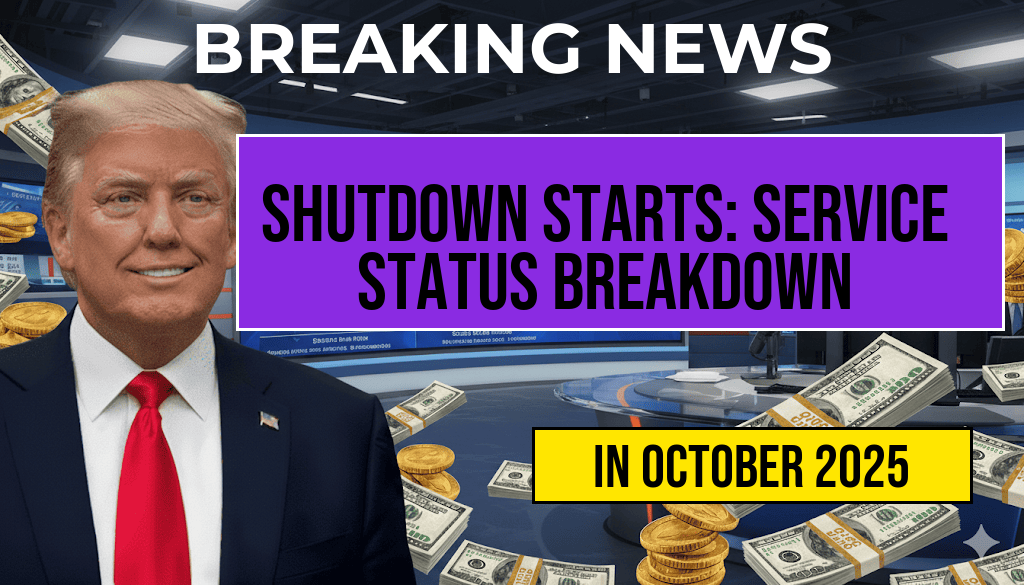The United States government has officially entered a shutdown phase as congressional negotiations over funding bills have failed to reach an agreement before the midnight deadline. This shutdown affects numerous federal agencies and services, with some operations continuing under existing funding measures while others are suspended or scaled back. The impact varies widely across departments, from critical social programs to national security functions. Citizens may experience delays in services such as Social Security payments, IRS operations, and airport security screenings, while military and defense activities are expected to persist largely unaffected. As lawmakers grapple with resolving the impasse, millions of Americans face uncertainty about access to government resources and services in the coming days.
Scope and Duration of the Shutdown
The shutdown commenced at 12:01 a.m. after Congress failed to pass a stopgap funding measure or full appropriations bills. The current impasse stems from disagreements over spending levels and policy provisions, with no clear resolution in sight. Historically, government shutdowns can last from days to weeks, depending on negotiations, but this particular deadlock threatens to extend beyond a few days if bipartisan cooperation remains elusive. During this period, many government functions will operate under contingency plans, though non-essential services will be halted or severely limited.
Agency-by-Agency Breakdown of Service Continuity and Suspensions
Social Security Administration
- Services Continued: Payments to retirees, disabled individuals, and survivors will proceed as scheduled. Customer service centers will operate remotely, providing assistance via phone and online platforms.
- Services Suspended: In-person visits and new application processing may be delayed due to staffing reductions, but beneficiaries will receive ongoing payments without interruption.
Internal Revenue Service (IRS)
- Services Continued: The IRS will continue processing tax refunds and critical enforcement activities, such as compliance investigations related to national security.
- Services Suspended: Most taxpayer assistance centers will be closed, and routine operations including audits and correspondence processing will be slowed or halted.
Department of Defense
- Services Continued: Military personnel will remain on duty, and essential national security functions will persist. Defense contractors with ongoing projects will continue operations under existing contracts.
- Services Suspended: Non-urgent administrative tasks, civilian employee pay, and certain non-essential activities will be suspended or delayed.
Transportation Security Administration (TSA)
- Services Continued: Airport security screenings will continue, ensuring passenger and cargo safety at airports nationwide.
- Services Suspended: Non-essential administrative staff and some customer service functions may be temporarily limited, but passenger screening remains unaffected.
Other Key Agencies and Their Status
| Agency | Services Continuing | Services Suspended or Limited |
|---|---|---|
| Federal Emergency Management Agency (FEMA) | Disaster response and recovery operations | Disaster assistance grants processing |
| U.S. Postal Service | Mail delivery and retail services | Limited administrative functions |
| National Parks Service | Limited public access to parks | Most visitor centers and facilities closed |
| Federal Trade Commission (FTC) | Critical enforcement actions | Routine consumer complaints processing suspended |
Financial and Economic Impact
The immediate effects of the shutdown include disruptions to federal operations and increased economic uncertainty. Government contractors, federal employees, and beneficiaries face delays or interruptions, which can ripple through local economies. Stock markets tend to react negatively to prolonged shutdowns, reflecting investor concerns over fiscal stability. Additionally, some services vital to public safety and health, such as food safety inspections or environmental oversight, may face reductions, potentially impacting the broader economy and public well-being.
Political Context and Next Steps
The shutdown underscores deep partisan divisions over government spending priorities. While some lawmakers advocate for continuing essential services through temporary funding measures, others seek to attach policy riders or budget offsets. Negotiations are ongoing, with potential for a short-term funding extension or a broader agreement to be reached in the coming days. Until then, government agencies are operating under contingency plans, and the affected public should prepare for possible service delays. Citizens are advised to consult official agency websites for the latest updates and guidance during this period.
For more detailed information on government shutdown procedures and impacts, resources such as Wikipedia’s overview of U.S. government shutdowns and official agency notices provide current updates and guidance.
Frequently Asked Questions
What services will continue during the government shutdown?
During the government shutdown, essential services such as Social Security payments, TSA screenings, and military operations typically continue to ensure national safety and public safety needs are met.
Which federal agencies are most affected by the shutdown?
The IRS, non-essential federal offices, and various administrative agencies face significant suspensions or closures, disrupting services like tax processing and federal permits.
Will I still receive my Social Security payments during the shutdown?
Yes, Social Security payments generally continue during a government shutdown as they are considered mandatory spending and are prioritized.
How does the shutdown affect tax services and the IRS?
The IRS may suspend public services, delay tax refunds, and halt audit activities, which can impact taxpayers and businesses awaiting assistance or processing.
What should travelers expect regarding TSA and security screenings?
TSA operations typically continue without interruption, ensuring airport security remains active, though some support staff might face temporary furloughs.










